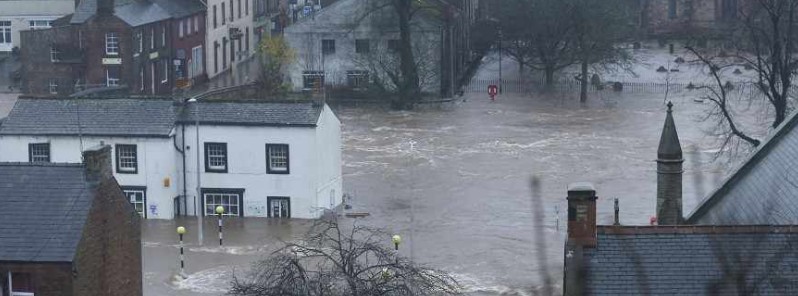British government failing to protect communities from the growing risk of flooding

A report published last week by the UK’s Environment Audit Committee warns that there has been a lack of effective long-term strategic planning in the UK about how to manage flood risk. The Committee urged the Government to stop being reactive and adopt a proactive approach to flood resilience.
"Our analysis of government flood funding and its approach to planning has demonstrated that the Government could do more to mitigate the future risk of flooding. Importantly, the Government appears to be reactive rather than proactive. If the Government fails to learn lessons and improve its long-term strategy then communities and businesses which would otherwise be protected will continue to suffer the unnecessary distress of being flooded," the Committee said.
"We know that flooding is the greatest risk the UK faces from climate change, so we were concerned that the Government didn't appear to have a long-term strategy towards flood defense funding, cutting it in 2010, only increasing after the 2013/14 flooding," said Mary Creagh MP, Chair of the Environmental Audit Committee.
The report focused on two areas of government policy which demonstrated the reactive nature of Government's approach to flood resilience: investment and planning.
"We found that Government spending on flood defense tends to fluctuate year-on-year. During the last Parliament, funding was initially cut and only increased due to the reactive funding injection following the winter 2013–2014 floods. This is worrying because the independent Worsfold review demonstrated a relationship between flood maintenance spending and the good condition of critical flood defenses. As the money required to maintain these defenses fell, so did the number of these defenses which meet the Environment Agency’s required condition. Any decline in the condition of critical assets represents a real world and unacceptable risk to local communities at risk of flooding. We are concerned that the Government only released this review when we requested it and it has been published only on our website," the Committee said.
The Government’s commitment to spend £2.3 billion and an additional £700 million on flood risk management is welcome, but the Committee remains skeptical that the Government will reach its target of protecting 300 000 properties. "The Government should also clarify whether the £2.3 billion will pay for 1 500 flood defense projects, as originally proposed, or 1 400 projects, which the Minister said during our inquiry. We were also surprised to hear that the additional £700 million of funding was based on a “political calculation”. This is an economically inefficient way of allocating Government resources. It highlights that the Government is continuing to take a reactive rather than proactive approach to funding flood risk management by ignoring the recommendations on these issues from previous reviews. Communities deserve more certainty that they will be protected from floods."
They warned that nationally significant infrastructure is not currently protected to a consistent standard and asked that infrastructure companies be mandated to report their target resilience level, why this target is appropriate and what progress they are making to achieve it.
In 2013/14 almost 10 000 properties were built in high flood risk areas across the UK, and, sadly, the same scenario is evident across the globe. Governments repeatedly underestimate the power of nature and fail to implement procedures that would prevent building in high flood risk areas.
The growing number of "record breaking rainfall" and "severe flooding" articles on The Watchers is not evident because we focus more on it; our focus is equally spread across all of our core categories. The fact is, extreme rainfall and severe flooding events are currently on the rise, but flooding is a number one natural disaster in terms of damage and lives lost since at least 1900.
Analyzing more than 35 000 natural disasters that occurred since 1900, CATDAT's risk engineer Dr. James Daniell from the Karlsruhe Institute of Technology found that about one-third of economic losses between 1900 and 2015 have been brought on by flood events, while at the same time, earthquakes have caused 26% of losses, storms 19%, and volcanic eruptions about 1% of losses. While the floods are accountable for the majority of the economic losses until 1960, in the subsequent period, storms and storm surges were responsible for 30% of the losses.
Dr. Daniell found that between 1900 and 2015, about half of people died due to floods. However, the flood death rate has been significantly decreasing since 1960 due to better planning, warnings, and preventive measures, while earthquakes have caused the highest, 40% of disaster deaths.
In conclusion, it seems the world is slowly, but steadily, waking up to the fact that better flood resilience and community education is necessary to save lives. This will become even more evident as the time passes and more record breaking rainfall events take place. At the same time, strong building regulations in earthquake prone areas should be implemented across the world.
Featured image: Flooding in Appleby, Cumbria, UK – December 2015. Credit: Shropshire Star

Commenting rules and guidelines
We value the thoughts and opinions of our readers and welcome healthy discussions on our website. In order to maintain a respectful and positive community, we ask that all commenters follow these rules:
We reserve the right to remove any comments that violate these rules. By commenting on our website, you agree to abide by these guidelines. Thank you for helping to create a positive and welcoming environment for all.